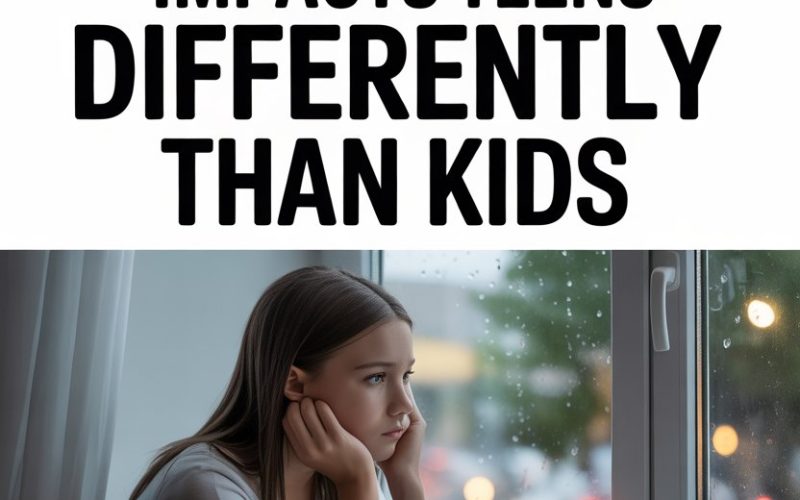Divorce is the ultimate family plot twist—no one really asks for it, yet here it is, flipping the script for grownups and kids alike. Now, when it comes to teens, the effects aren’t just a simple rerun of what happens to younger kids.
Teenagers live in a world full of hormones, homework (yes, for them, not you), and a desperate wish to be understood. Throw a marital split into the mix and things can look very different from the little-kid experience.
Here’s what parents need to know—without the drama of a Shakespearean tragedy, and with a few practical ideas to help your teen weather the storm.
1. The Myth of the “Mature Teen”
You hear it all the time: “At least she’s old enough to understand.” Cue the eye roll—teens might look mature while raiding your fridge, but emotionally, things are a little more scrambled.
Teens may seem almost adult in some ways, but emotionally, they’re still sorting themselves out. Divorce can hit them right in the feels—hard.
Unlike young children who might show their distress through tantrums or clinginess, teens often pretend nothing’s wrong or retreat behind their phones. This doesn’t mean they’re unaffected.
In fact, a study from the American Academy of Pediatrics found that teens may internalize stress, leading to moodiness, irritability, or even withdrawal.
What can you do about it? Stay present, even if your teen seems to want nothing to do with you. Tiny acts—like offering a snack, a casual car chat, or simply being in the same room—count for more than you think.
Keep your “parental radar” on for any major changes in sleeping, eating, or schoolwork.
2. Identity in Flux
If there’s a time in life when you want to feel stable, it’s during the teen years. Teens are busy figuring out who they are, what they believe, and whose TikTok dances are actually cool.
Suddenly, the foundation they thought they had—two parents, one home base—starts shifting.
Divorce can shake a teen’s sense of identity. Some worry they’ll “pick sides” by spending more time with one parent.
Others wonder if the split says something about them. Is this my fault? Will my relationships end badly too? (For the record: No, and also no.)
Give your teen room to talk about these big questions—even if you’re secretly tired of the existential monologues. Let them know it’s fine to love both parents without guilt.
Consider encouraging them to chat with a trusted adult outside the family, like a school counselor.
A study published in the Journal of Adolescence highlights the value of supportive non-parental adults in promoting resilience through family transitions.
3. Parentification: When Teens Become the Grownups
This is the sneakiest effect of all. While younger children are often shielded from adult concerns, teens may get a front-row seat to the drama.
Sometimes, they’re expected to shoulder responsibilities—helping with siblings, managing household chores, or even offering emotional support to a struggling parent.
This phenomenon, known as “parentification,” turns the normal parent-child dynamic upside down.
This can make your teen grow up fast—but not always in a good way. Research from Psychology Today notes that teens who are overburdened by adult roles are more likely to experience anxiety, depression, or resentment.
Here’s the fix: Watch for signs your teen is doing too much. If you find yourself venting to your child or relying on them for support you’d normally seek from another adult, take a step back. Ask yourself, “Is this my child’s job?”
Spoiler: It probably isn’t. Encourage your teen to maintain their usual routines and friendships—yes, even if that means rolling your eyes at their group chat drama.
4. Trust Issues and Romantic Relationships
Teens are already skeptical about love, thanks to a diet of awkward rom-coms and TikTok breakup videos. Divorce can crank up their cynicism, making them wary of romantic relationships, commitment, or even getting close to friends.
A review from Harvard’s Center on the Developing Child notes that adolescents from divorced families may take longer to trust partners, fear conflict, or expect relationships to fail.
Some even swear off romance entirely, at least until the temptations of university orientation week.
What helps? Keep your own dating life private until things are truly serious. Avoid “oversharing” the gory details of your divorce with your teen. Be honest, but maintain healthy boundaries.
Model respectful communication, even if you have to grit your teeth when texting your ex about carpool. Suggest positive role models—real or fictional—who show that healthy relationships are possible.
5. Academic and Social Rollercoaster
Divorce can shake up academic focus and friendships. Teens might act like they don’t care about school, but the emotional whirlwind can play havoc with concentration, motivation, and grades.
Some throw themselves into activities or social groups for distraction; others retreat and isolate, ghosting friends and skipping extracurriculars.
The National Association of School Psychologists points out that teens from divorced families often experience more school-related stress and are at increased risk for absenteeism.
Add a sprinkle of “new routines” (hello, forgotten PE kit at the other parent’s house), and things can get messy.
Encourage your teen to keep up with activities that matter to them, even if you have to drive across town twice in a day. Stay in touch with teachers if you sense a slide.
Try to maintain consistent rules and expectations in both homes, even if your ex thinks bedtimes are a government conspiracy.
Finding the Silver Linings
Divorce certainly throws a few curveballs, but here’s the thing: teens often come out the other side with strengths that surprise everyone.
They may develop empathy, resilience, and a level of independence that makes their future flatmates look downright helpless by comparison.
Your job? Keep showing up. Stay curious about how they’re feeling, even when their answers sound like they were ghostwritten by Siri. (Grunt = “not now,” Shrug = “possibly, but only if snacks are involved.”)
Remind them, without words if you must, that they’re still the centre of your universe—even if the universe is running on half the petrol and double the laundry.
And if you’re feeling stuck, remember there’s no shame in seeking help from professionals. Sometimes, the wisest thing a parent can do is wave the white flag and call in reinforcements.
Every family’s story is a little different.
But with honesty, empathy, and plenty of patience, you and your teen can write a new chapter—one where love and loyalty take centre stage, no matter what the credits say.




